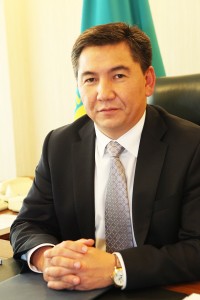ASTANA – The Jan. 22 Senate plenary session established a new basis for youth policy in Kazakhstan, approving a draft law “On State Youth Policy of the Republic of Kazakhstan” and introducing amendments to the existing legislation.
“The draft law defines the main objectives and directions of the state youth policy, competence of central government agencies, as well as mechanisms of formation and implementation of the state youth policy,” Minister of Education and Science Aslan Sarinzhipov said presenting the bill.
Earlier, during a Jan. 15 meeting at the Akorda presidential residence, Kazakh President Nursultan Nazarbayev assessed economic and social situation in the state given negative trends in the world economy and aggravating geopolitical tensions. He stated that at the end of 2014, the government was asked to develop various scenarios for different economic conditions to prevent an economic slowdown and ease the burden of the expected economic woes on citizens.
As young people and the elderly are most prone to suffering the consequences of economic instability, the draft law was developed to create an effective model of state youth policy aimed at promoting the economic and social development of young people and creating conditions for the active participation of young people in the social and political life of the state.
It presumes the integration of a database of universities and colleges with the State Centre for Pension Payments (SCPP) database for a more accurate accounting of unemployment and employment rates among young people in the country.
“In 2015, we plan to integrate our database – universities and colleges – with the SCPP database so we will be able to see the real picture based on pension contributions. If a young person makes pension payments, then he is really employed,” said Sarinzhipov.
“In 2000, the unemployment rate among young people amounted to about 18 percent, while in 2009 the figure was 8.5 percent. And at the end of 2014, youth unemployment was 4.3 percent and for the first time in 2014 the figure was lower than the unemployment rate in the whole country, which was 5.5 percent,” he said, adding that the current employment rate of graduates of universities and colleges in Kazakhstan was about 75 percent, which was a fairly high percentage.
Among changes aimed at promoting youth employment were cancellation of the probationary period for workers under 18 and the introduction of an obligatory two-year employment contract for young first-time workers.
“The draft law [On Amendments and Additions to the Labour Code of the Republic of Kazakhstan] is aimed at protecting the rights of young people at work. Its adoption will increase the term of the employment contract with young professionals and expand categories of young people who do not have to go through a probationary period,” said the minister.
Thus, the minimum term of an employment contract with a young first time worker was set at two years. In addition, a probationary period was excluded for persons under the age of 18 years, as well as for those who have mastered educational programmes in educational institutions and have come to work in their specialty for the first time, not later than one year from the date of graduation.
Byrganym Aitimova, member of the Kazakh Senate and a former minister of education herself, stated that as the law would apply and be relevant to more than 25 percent of the population, the government should thoroughly elaborate the mechanism.
Following the adoption of the bill by the Senate, it is sent to the head of state for review and signing into law.
Addressing other changes in Kazakhstan’s youth policy, Sarinzhipov announced suspension of implementation of 12-year secondary education as the experiment was ending in May. He underlined financial reasons as one of the main factors that influenced the decision.
“Now the ministry and the government are working under the instruction of the President to prepare for the different scenarios of development, including in the economy,” Sarinzhipov stressed.
He added that the ministry developed separate rules for Unified National Testing UNT and university entrance for students who were enrolled in the programme of 12-year education, that is, about 400 people.
“All work and all the results received during the experiment will be used to improve the programme of 11-year education,” he concluded.

